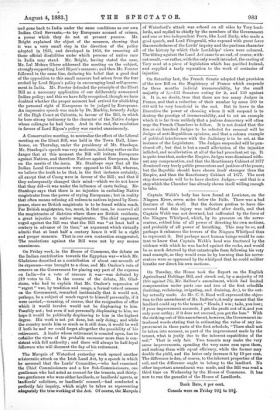On Tuesday, the House took the Report on the English
Agricultural Holdings Bill, and struck oat, by a majority of 90 (166 against 76), Mr. Balfour's amendment, which had limited compensation under parts one and two of the first schedifle (building, reclaiming, irrigating, and draining, &c.), to the out- lay actually made. As Mr. C. S. Read well expressed the objec- tion to this amendment of Mr. Balfour's, it really meant that the landlord could say to the tenant," Heads, I win ; tails, you lose ; if your improvement succeeds, I get the profit out of it, and you only your outlay; if it does not succeed, you get the loss." With the striking-out of this amendment, however, the Government in- troduced words stating that in estimating the value of any im- provement in these parts of the first schedule, "There shall not be taken into account, as part of the improvement made by the tenant, what is justly due to the inherent capabilities of the soil." That is only fair. Two tenants may make the very same improvements, spending the very same sum upon them, and making them with equal efficiency, while the former may double the yield, and the latter only increase it by 10 per cent. The difference is due, of coarse, to the inherent properties of the soil, and the difference ought to belong to the landlord. No other important amendment was made, and the Bill was read a third time on Wednesday by the House of Commons. It has now to run the gauntlet of the House of Landlords.


































 Previous page
Previous page